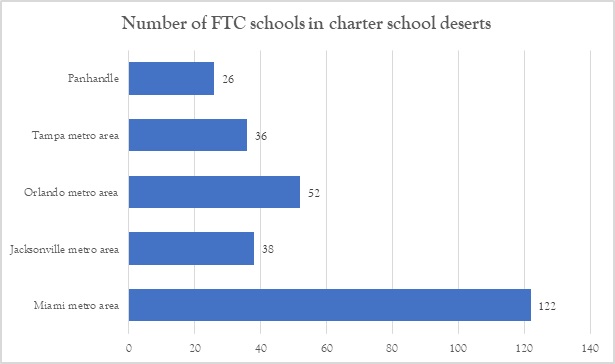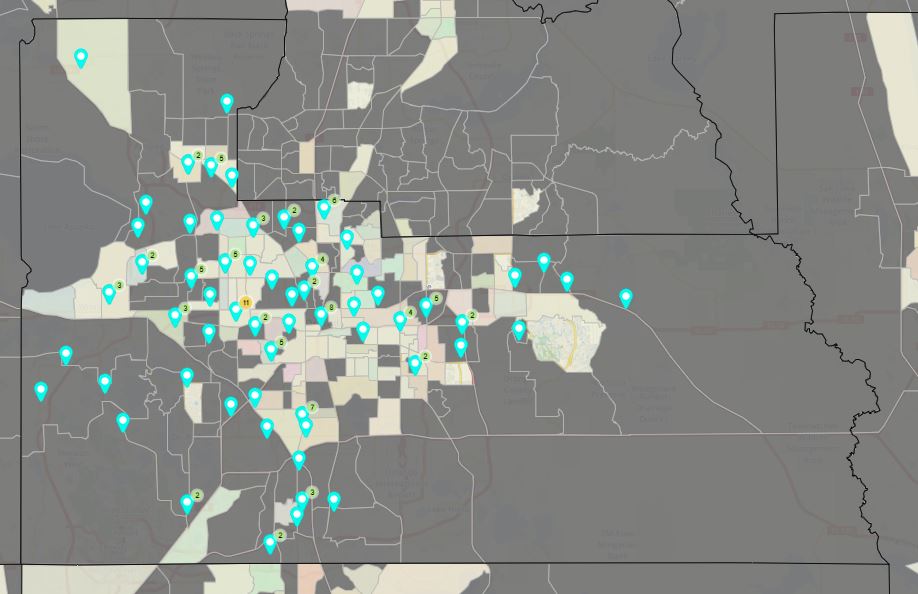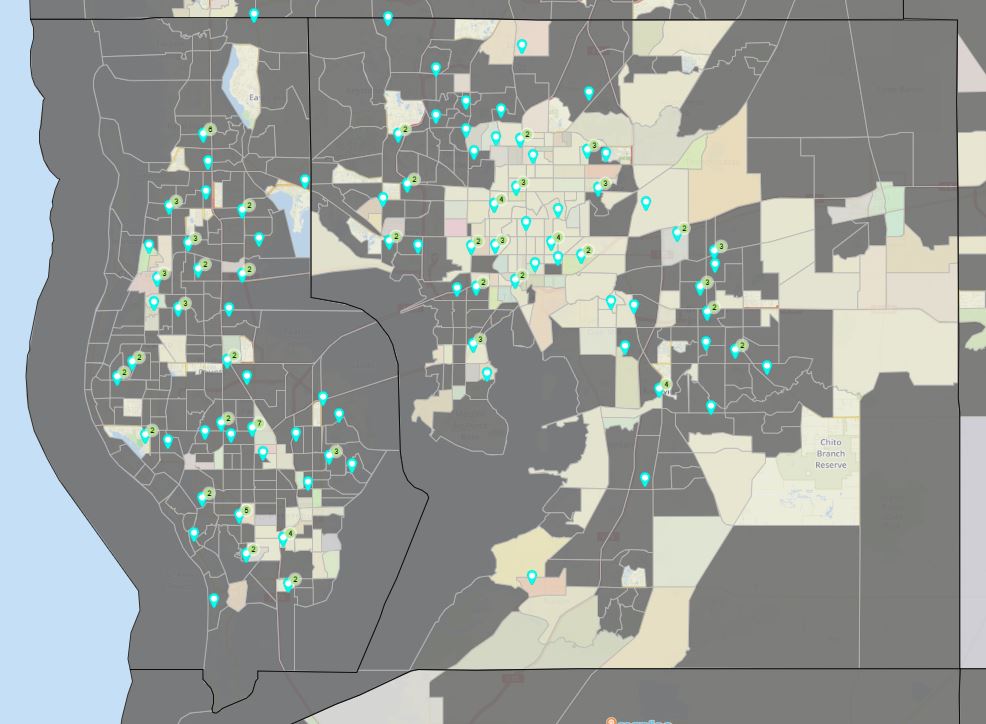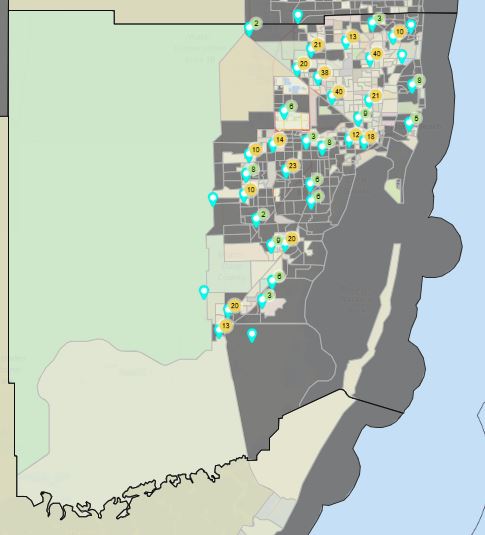The nation’s largest private school choice program provides dozens of additional school options to children living in Florida’s charter school deserts.
A recent report by the Thomas B. Fordham Institute found the Sunshine State is home to 20 areas where three or more contiguous Census tracts have more than 20 percent of the population living below the poverty level, and no charter schools that serve the elementary grades.
Step Up For Students, which publishes this blog and helps administer Florida’s tax credit scholarship program, built on that analysis. We found dozens of private schools in those areas that accept the scholarships, which help low-income and working-class people pay tuition. Both Fordham’s and Step Up’s analyses rely on visual inspections of maps and school locations.
 Dozens of private schools in charter school deserts accept Florida tax credit scholarships. This graph covers five major regions of the state but does not include every “desert” region in Florida.
Dozens of private schools in charter school deserts accept Florida tax credit scholarships. This graph covers five major regions of the state but does not include every “desert” region in Florida.The power of private school choice to complement charters and other public-school options may be most pronounced in the western part of Orlando. It’s home to two ZIP codes where a staggering 2,357 children use tax credit scholarships to pay private school tuition.
Those two ZIP codes are home to just two charter schools — the Lucious and Emma Nixon Charter Academy (a new upstart not included in the Fordham report) and the Pine Hills campus of UCP (which operates charter schools catering to children with special needs). The latter school happens to share a Census tract with St. Andrew Catholic School, an institution that received a presidential spotlight last year.
In the Orlando metro area as a whole, 52 schools located in charter school deserts accept tax credit scholarships.
 Florida tax credit scholarships expand access to 52 private schools (blue markers) in Orange County’s charter school deserts (beige).
Florida tax credit scholarships expand access to 52 private schools (blue markers) in Orange County’s charter school deserts (beige).Desertification has also set in across huge swaths of Tampa’s urban core and much of South St. Petersburg. The landscape has changed slightly since Fordham gathered its data. Two charter schools in struggling areas of Tampa Bay have closed. One is permanently shuttered. The other was taken over by the district, and converted into a magnet school. On the other hand, a promising new oasis has formed in the desert of East Tampa.
Many of the more established options are private schools that open their doors disadvantaged students thanks to scholarships. They range from faith-based institutions, like St. Pete’s Mt. Zion Christian Academy or Tampa’s St. Joesph’s Catholic School, to secular academic powerhouses like Academy Prep Center, whose two locations lie in desert areas of Hillsborough and Pinellas Counties.
 Florida tax credit scholarships expand access to 36 private schools (blue markers) in the Tampa Bay region’s charter school deserts (beige).
Florida tax credit scholarships expand access to 36 private schools (blue markers) in the Tampa Bay region’s charter school deserts (beige).In South Florida, a charter desert stretches from Miami’s Little Haiti neighborhood to the northwest, into Hialeah and Opa-Locka. Miami-Dade County is home to 130 charter schools. But it’s home to 439 private schools that accept scholarships, and 122 of those are in charter school deserts.
Still other private schools, like the one founded by prominent pastor Bishop Victor Curry, lie just outside regions classified as deserts. Dr. John A. McKinney Christian School sits in a Census tract whose poverty rate of 14.1 percent does not qualify it as a desert. But it likely draws students from the desert tracts that surround it on three sides.
The same could be said for the South Florida School of Excellence. It sits in a neighboring tract where Beacon College Preparatory operates a charter school, and where the poverty rate tops 50 percent. Students in that area, just south of the Opa-Locka Executive Airport, need all the help they can get.
 Florida tax credit scholarships expand access to more than 100 private schools (blue markers) in Miami-Dade County’s charter school deserts (beige).
Florida tax credit scholarships expand access to more than 100 private schools (blue markers) in Miami-Dade County’s charter school deserts (beige).In Florida, many providers contribute to a diverse school choice ecosystem. They’ve contributed to a vibrant, steadily improving public education system. And while more work remains to give every family access to schools that truly meet their needs, more help is also on the way.



Hello Admin,
Nice information shared by you and thanks for sharing this useful information with us.“Sheep Heritage Foundation Memorial Scholarship”. The scholarship is for the advancement of the sheep industry, lamb, and wool, through financial support of a graduate-level (MS or Ph.D.) student who is attending a school in the U.S.
Application Deadline is: May 31, 2018
For more information, you can visit the given link:
https://www.developingcareer.com/sheep-heritage-foundation-memorial-scholarship/
You can also join our Facebook page for the updates. The link is given below
https://www.facebook.com/DevelopingCareer
Private schools are a particularly important contributor to any system helping the United States to develop a better educated public, because they aren’t subject to the “Every Student Succeeds” act, as charter schools are, which means that they are under no compulsion to narrow their curricula to the only two subjects that count in most of the mistakenly narrow public school accountability systems that ESSA insists upon. With this freedom, private schools can achieve standards not only in English and mathematics, but also in science and additional languages, for example, at a faster pace than the unfortunate children stuck in state schools have been condemned by government leaders to languish in. In addition, the narrow, misbegotten teacher evaluation systems that some states have burdened themselves with do not apply to private institutions, nor are they bound by collective bargaining agreements or state laws that grant permanent tenure to unsatisfactory, uncooperative, mistakenly protected union contract teachers, so teachers can be relied upon to show up in class and not abandon their children in favour of illegal strike activity.
Fundamentals are important. Private schools provide that.